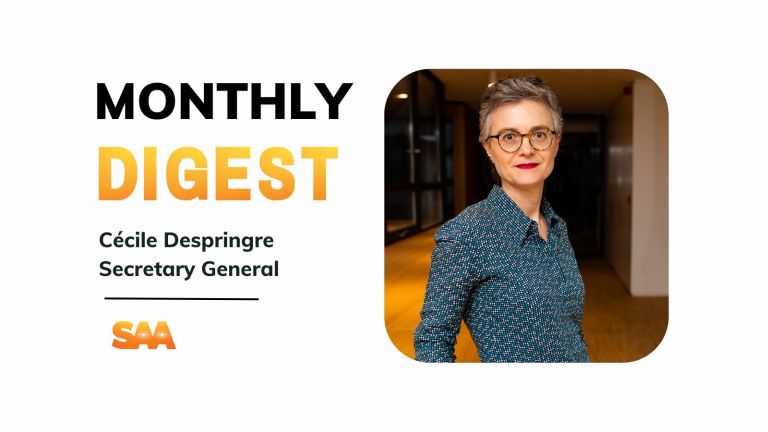Secretary General's November Digest, 2023

After a busy (and very rainy) November, I am happy to be writing to you with good news from the international stage and Bulgaria - showing that persistent advocacy and close collaboration with partner organisations are keys to success!
A study on the audiovisual authors’ rights and remuneration on the international agenda
Beginning of the month I went to Geneva for the meeting of the WIPO Standing Committee on Copyright and Related Rights (SCCR) to raise awareness on the needs and challenges of audiovisual authors in terms of their rights and remuneration. Together with CISAC, our efforts were rewarded by the submission by Côte d’Ivoire of a proposal for a study to be discussed at the meeting. The proposal was supported by the African group, the EU, Uruguay, Russia, Senegal, Malawi and Tanzania, while the US requested more time to review it (a diplomatic way to oppose). It was decided that the proposal will be further discussed at the next committee meeting in April 2024. Having a proposal tabled that made it on the agenda was a win in itself. Next, we will continue our advocacy to have it supported by even more countries and endorsed at the next SCCR meeting, so that the study can start being conducted in 2024.
A vote for an improved copyright law in Bulgaria
After Geneva, I joined SAA member Filmautor in Sofia for a meeting with Mr Toma Bikov, Chair of the Culture and Media Committee of the Bulgarian Parliament on 10 November, in the context of the implementation of the 2019 Copyright Directives. Filmautor, together with all Bulgarian CMOs and the support of the SAA and CISAC have for a long time campaigned for copyright reform in order to fix the broken retransmission market and private copying. It has been a long struggle due to political instability (5 elections in 2 years) and lack of willingness to strengthen the authors’ position. On 23 November, the Parliament passed amendments to the Bulgarian Copyright Law implementing the two directives. According to Filmautor, the adopted law is far more balanced than the initial draft by the Council of Ministers and close to the best practices in the EU Member States. Some of the achievements are the improved wording for retransmission which should strengthen the mandatory collective management regime of the retransmission right for authors. Retransmission operators will now have an obligation to pay the authors’ respective CMOs. For the remaining issues such as authors’ right to remuneration for other exploitations like as video-on-demand and private copying, the Chair of the Culture and Media Committee we met promised to set up a working group.
Members' meeting in Vienna
On 15 November, the SAA held its biannual meeting in Vienna, hosted by its Austrian member VdFS. On the evening before the meeting, VdFS invited us to a lovely rooftop reception where we were happy to meet with two of the Austrian SAA Patrons: Werner Boote and Gerhard Ertl. Barbara Hayes, Chair of the SAA board, delivered a welcoming speech, expressing her frustration that many of us shared: "I feel really upset that we have to defend ourselves in this world the way we are. Technology companies have taken over the narrative on AI and we have to try to change it, because right now it is wholesale theft that is going on in the world of AI, and nobody is paying for it. I personally feel we should be a lot bolder in calling out the technology companies to make sure our creators not only retain jobs but certainly get paid for their works.". Big thanks to Gernot Schödl, managing Director of VdFS, and his team for hosting us!
Artificial Intelligence
I must admit, I am spending quite some time keeping abreast with the rapid feed of articles and news from experts, stakeholders and policymakers assessing the legal and societal implications of AI for the cultural and creative sectors. It only strengthens my conviction that the Text and Data Mining exception should not be applicable to the use of protected works by AI developers (see SAA's position on AI of 4 October). The legislator of 2019 did not have this technology in mind when adopting the Copyright Directive. Axel Voss, the European Parliament's rapporteur for the 2019 Copyright Directive, confirmed this on several occasions. However, the EU Commission argues the contrary and might try to consolidate its approach in the AI Act. The final negotiations on the proposed EU AI Act are difficult and concerning. Some of the EU countries that usually stand behind the creators have now turned their back (France, Germany, Italy). Instead, they are driven by the aspiration to become the 'next in tech', influenced by national companies claiming less regulation equals more innovation. Together with many other stakeholders, we have been working on joint advocacy efforts and letters to show the Commission that we are numerous and alarmed by their position and its consequences on authors and other creators. The final trilogue meeting on the AI Act is planned on 6 December.
Coming up
The SAA Board of Directors will have its last meeting of the year online in December to continue our discussions on the work by the EU institutions and what windows of opportunities we have to advocate for audiovisual authors' rights and cultural diversity.
I will come back to you before the holidays with a final update of the year. Until then, I wish you a crisp blue sky December, close to warm radiators and far away from nasty colds!
Best regards,
Cécile Despringre
My 3 reading tips:
- No Step-Free Copyright Exceptions: The Role of the Three-step in Defining Permitted Use of Protected Content (including TDM for AI-Training Purposes) by Eleonora Rosati, Stockholm University Research Paper
- To be or not to be…transparent - Pour un principe matriciel de transparence dans l’environnement numérique by Alexandra Bensamoun, Dalloz Actualité
- Consumer groups file complaint against Meta’s ‘pay-or-consent’ model, Euractiv
